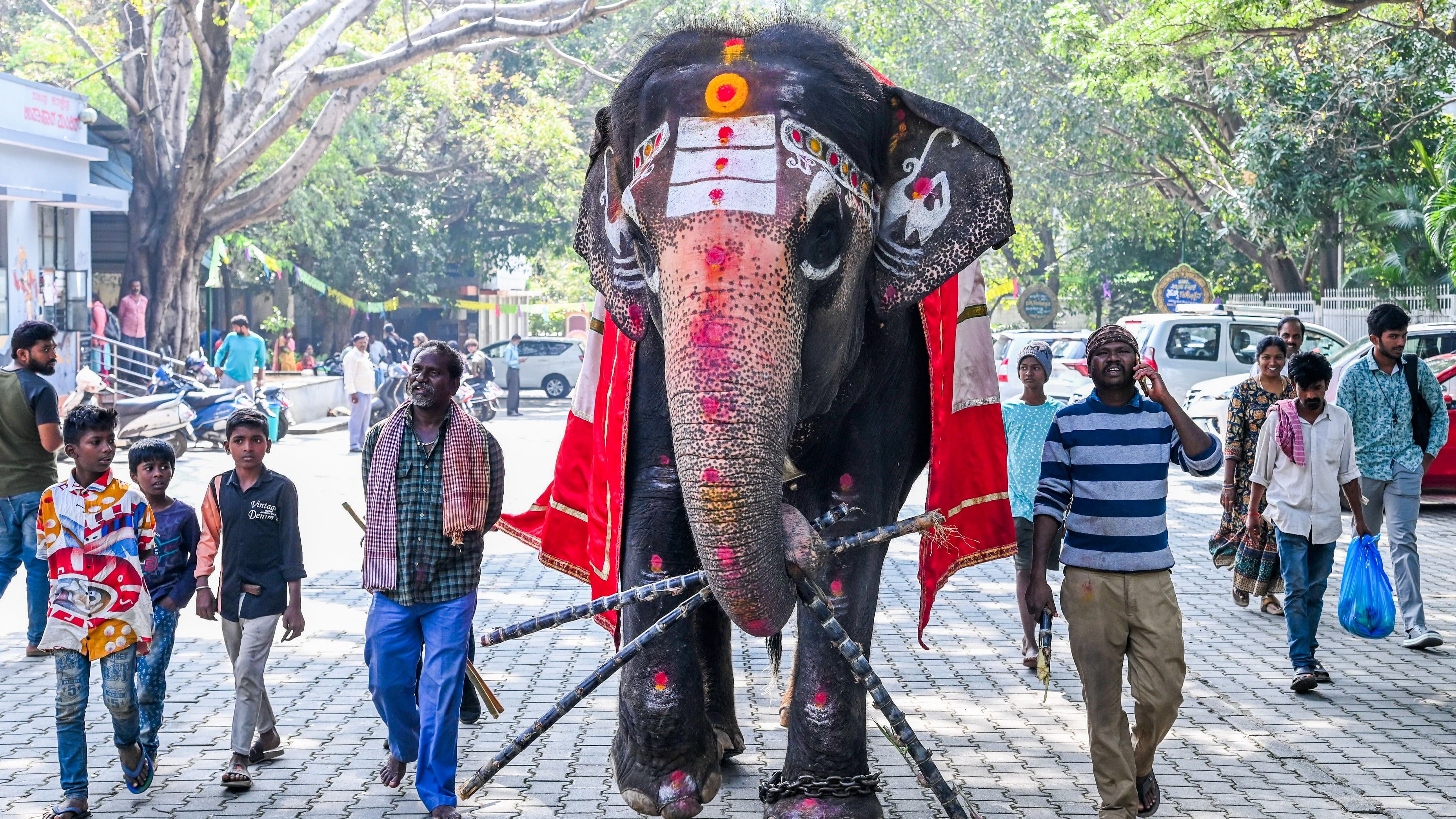
WRRC has been tracking the well-being of domesticated elephants for over two decades and it publishes annual and decadal reports.
Credit: DH File Photo
Most of Karnataka’s domesticated elephants are leading a “painful” life under harsh conditions with limited access to healthcare, says a study conducted by the Bengaluru-based Wildlife Rescue and Rehabilitation Centre (WRRC). The animals are more often leading solitary lives, the survey found.
Karnataka officially has 30 domesticated elephants with temples and mutts.
WRRC has been tracking the well-being of domesticated elephants for over two decades and it publishes annual and decadal reports. The latest study is from 2022.
Of the 30 private elephants in the state, 27 are female and one a sub-adult. According to the organisation’s study, 21 elephants were purchased from the forest department and the remaining nine were inherited or gifted from other sources.
The reports — ‘Captive Elephants of Temples of India; An Investigation into the Status, Management and Welfare Significance’ and ‘Database for Captive Elephants and their Mahouts in Karnataka’ — state the elephants are being deployed for purposes other than “religious”, including begging, processions, wedding and cultural events, as a few temple managements are not in a position to take care of these animals.
Suparna Ganguly, animal activist and co-other of WRRC reports, said all the elephants observed by her team were living in unnatural and unsuitable work conditions. “The elephants were made to stand on stone or concrete floors in front of temples for long hours resulting in foot-related ailments. They were exposed to the sun while blessing people (repetitive action causing strain to the trunk), and begging for money or food. None of these activities is part of an elephant’s natural way of life and involves a lot of training and forsaking of natural behaviours.”
She said none of the elephants was allowed to range free, even at night. They were chained for an average of 14.9 hours a day.
The reports also said that only 17 of the 30 elephants had regular medical access from a veterinarian. The experts’ team in 2009 and 2013 had suggested taking two elephants from a temple in Gadag and one in Davangere into the forest department’s custody as they were living in an unhealthy environment. But the captive elephants continue to serve at those temples.
The management of Sri Jagatguru Pakkireshwara Samsthana Mutt, Gadag, did not wish to comment on the poor living conditions of the temple elephant, Champa.
Experts working for the rights of domesticated elephants point out that hardly any temple or mutt follows the rules set by the Forest Department on micro-chipping the animals.
Ramesh Belagere of the Foundation for Ecology and Education Development said the Ministry of Environment, Forest and Climate Change has made micro-chipping mandatory for all captive elephants so that the chief wildlife warden of the state can monitor their health and whereabouts. “Many are not following this law,” he said.
He also said there are a few captive elephants without proper ownership certificates serving at temples without the knowledge of the department. “Though the elephants are permitted to perform religious duties at the temple for a specific time, a few religious institutes are using the animals for cultural and personal events against the law,” he said.
Lakshminarayana Rao, manager at the Dharmasthala Manjunatheswar Temple, which has three elephants — the maximum owned by a temple in the state — including a juvenile female elephant that was born in captivity, said they have not implanted a microchip as the elephants are not released into the forests. “We have all the required certificates and our elephants are well looked after by mahouts and veterinary doctors,” he said.
Additional Principal Chief Conservator of Forests (Project Elephant) Saswati Mishra said all temple and mutt managements have been instructed to do the upkeep of elephants as per the rules prescribed by the Union government.
“We have taken action against temples which failed to provide basic health facilities. In future, if they fail to maintain the elephants, the department will take the animals into its custody,” she said.
Saswati said irrespective of whether the elephants are released into the forests or not, they should be fitted with microchips.
Highlights - Jumbo worry Karnataka officially has 30 elephants at its temples and mutts — 27 female and one sub-adult Study says animals living in 'unnatural and unsuitable' conditions Made to stand on stone or concrete floors for long hours resulting in foot-related ailments Chained for almost 15 hours a day; no regular medical access Micro-chipping must for all captive elephants, but most temples don't follow law